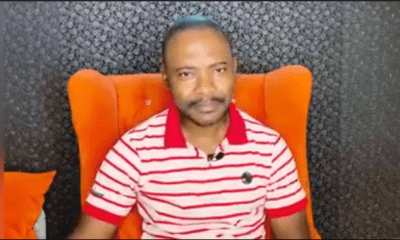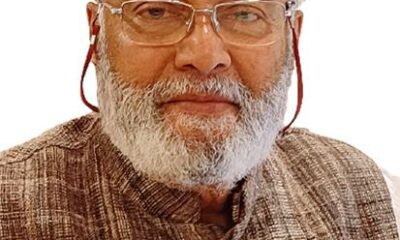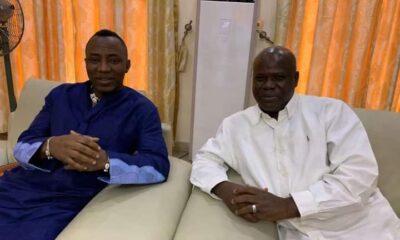Political Issues
Soludo And Ekwunife’s Spar As Reminiscence Of Fela’s Yabis Night -By Isaac Asabor
If Soludo and Ekwunife must engage in political banter, let it be in the tradition of Fela, mocking each other’s policies and performance records, not their persons. Let Soludo “yab” Ekwunife on her legislative record and contributions to Anambra’s development. Let Ekwunife “yab” Soludo on his budget priorities, his infrastructure projects, or his handling of insecurity. That way, citizens can laugh, reflect, and learn. That way, insults will be transformed into instruments of accountability.

In Nigeria’s political landscape, memories of Fela Anikulapo Kuti’s legendary Yabis Night at the Afrika Shrine remain evergreen. Every Thursday, the Afrobeat maestro turned his stage into a theatre of political satire. With blistering lyrics, unsparing humor, and biting sarcasm, he fearlessly exposed the excesses of corrupt leaders and the hypocrisy of multinational corporations. Fela’s stage was not merely for entertainment; it was a classroom of political consciousness, a platform for civic education, and a site of public reckoning.
Today, however, Nigeria’s political theatre, particularly in Anambra State, seems to be staging its own version of Yabis Night. Only that this time, instead of Fela’s artful mix of satire and substance, the drama is dominated by verbal brickbats and character assassinations between two towering figures: Governor Chukwuma Charles Soludo and Senator Uche Ekwunife. The recent exchange of insults between the duo is reminiscent of the banter, ridicule, and “yabs” that characterized Fela’s Shrine. Yet, unlike Fela’s satirical genius, the present spectacle adds little value to the political education of Ndi Anambra.
This writer argues that the Soludo–Ekwunife spat is more of a political distraction than a democratic necessity. Like Fela’s Yabis Night, it entertains the crowd, but unlike Fela’s satire, it fails to illuminate the burning issues confronting the state. Anambra’s electorate deserves better. The governor and the senator must transcend personal attacks and engage in issue-based politics that address unemployment, infrastructure decay, security challenges, and the deepening poverty ravaging the state.
To appreciate the gravity of the ongoing spat, it is necessary to revisit what Yabis meant in the Fela era. The word, drawn from Nigerian Pidgin English, means to mock, to lampoon, or to call out with humor. Fela perfected it as both an art and a weapon. He was fearless in “yabbing” military rulers who thought themselves untouchable; Olusegun Obasanjo, Ibrahim Babangida, Sani Abacha, and their ilk. Through satire, he distilled complex issues, corruption, imperialism, bad governance, into language ordinary people could grasp. Importantly, Fela’s yabs were not empty insults. They were rooted in ideology, backed by his Afrobeat rhythms, and directed at awakening collective resistance.
Contrast this with the Soludo–Ekwunife drama. What Nigerians and, more specifically, Anambrarians have witnessed in recent weeks is less of ideological satire and more of gutter politics. Words have been traded that demean the stature of both the governor and the senator. Instead of sharpening citizens’ understanding of governance, the exchanges merely deepen divisions and reduce politics to a gladiatorial contest of egos.
Without any iota of exaggeration, Anambra deserves more than verbal fireworks. The reason for the foregoing views cannot be farfetched as Anambra is no ordinary state. Historically, it has produced some of Nigeria’s most accomplished intellectuals, business moguls, and political thinkers. From Nnamdi Azikiwe, Nigeria’s foremost nationalist, to Chinua Achebe, the literary giant, to present-day industrialists, the state has been a cradle of excellence. Anambra is also one of Nigeria’s most politically aware states, with a citizenry that takes pride in interrogating governance.
Yet, the state is currently beset by challenges that cannot be solved by rhetorical sparring. Insecurity continues to trouble several communities, with violent groups destabilizing social and economic life. Youth unemployment is rife, leaving many young people vulnerable to crime or migration. Infrastructure, particularly in rural areas, is crying for urgent attention. The health and education sectors need revitalization to meet the aspirations of Ndi Anambra. These are the real issues that should dominate political discourse, not the trading of insults that may amuse partisan followers but ultimately trivialize governance.
Without a doubt, the brat between both can fittingly be described to be the futility of gutter politics. The danger of continuing with gutter politics is that it diminishes the credibility of both the participants and the institutions they represent. When a sitting governor and a sitting senator resort to personal attacks, they inadvertently signal that politics is not about service but about supremacy. They embolden their supporters to replicate the same culture of insult and abuse, poisoning the civic space.
Moreover, gutter politics blinds the public to accountability. Citizens who should be asking hard questions about budgets, projects, and policies become distracted by the theatre of insults. Instead of demanding explanations about how resources are being deployed, they take sides in a quarrel that yields no tangible benefits.
If there is one lesson the Soludo–Ekwunife feud can draw from Fela’s Yabis Night, it is that satire must serve substance. Fela ridiculed leaders, but his ridicule always pointed to systemic issues, military brutality, IMF policies, or the betrayal of Africa’s working class. In other words, his yabs were a means to an end: awakening the people to demand change.
If Soludo and Ekwunife must engage in political banter, let it be in the tradition of Fela, mocking each other’s policies and performance records, not their persons. Let Soludo “yab” Ekwunife on her legislative record and contributions to Anambra’s development. Let Ekwunife “yab” Soludo on his budget priorities, his infrastructure projects, or his handling of insecurity. That way, citizens can laugh, reflect, and learn. That way, insults will be transformed into instruments of accountability.
Unfortunately, Nigeria’s democracy, as fragile as it is, cannot afford the trivialization of politics into insult contests. The Independent National Electoral Commission (INEC), civil society groups, and even religious leaders have long emphasized the need for issue-based politics. Issue-based campaigns and debates provide voters with clear choices. They force politicians to articulate their visions, justify their actions, and commit to measurable outcomes.
In Anambra, issue-based politics is particularly critical. With the state’s history of political volatility, ranging from intra-party feuds to electoral violence, leaders must model a culture of civility. The 2025 political season is already heating up, and the electorate deserves a debate about development, not a rerun of Yabis Night stripped of substance.
Governor Soludo, as a former Central Bank governor and an economist of repute, has the intellectual capacity to elevate political discourse. His achievements in academia and global institutions suggest he can engage issues at a sophisticated level. Reducing himself to street-level banter does not serve his pedigree or his office.
Senator Ekwunife, on her part, has spent years in the National Assembly and is no stranger to the weight of legislative responsibilities. She is one of the few women who have navigated Nigeria’s male-dominated political terrain with resilience. Her voice should be amplifying the concerns of Ndi Anambra, especially women and youth, not drowning in the noise of insults.
Both leaders must therefore pause, reflect, and recalibrate. Anambra deserves leaders who can debate policies, propose solutions, and inspire the electorate.
The spat between Governor Chukwuma Soludo and Senator Uche Ekwunife may have entertained the public, but entertainment is not governance. The comparison with Fela’s Yabis Night is instructive: Fela used satire to educate; our politicians today use it to score cheap points. If politics continues on this trajectory, the electorate will remain the ultimate loser, distracted by drama while critical issues fester.
It is high time Soludo and Ekwunife replaced verbal warfare with issue-based engagement. Let them compete on who has the better policy for youth employment, the better plan for rural roads, the stronger vision for security, the more sustainable blueprint for education and health. Let them spar, but let their sparring illuminate issues and empower voters.
If they must “yab” each other, let it be in the spirit of constructive satire, not destructive invective. Only then can politics in Anambra rise above entertainment to deliver the governance its people deserve.










